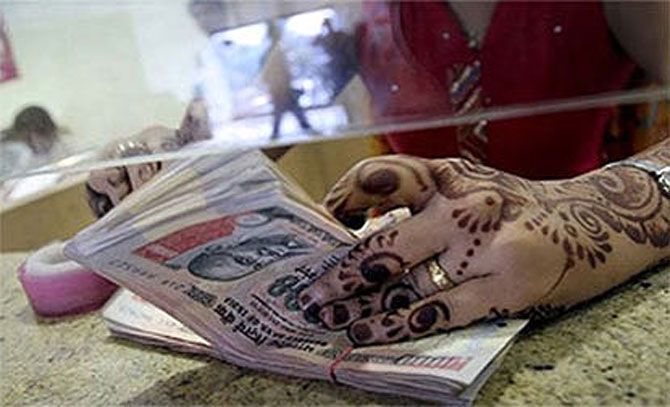 A system of multiple regulations operating in silos has created grey areas that foster illegal money raising
A system of multiple regulations operating in silos has created grey areas that foster illegal money raising
A group of people from the chit fund sector wrote a Right to Information application seeking the details of the procedure to register a chit fund.
They wanted to know what the rules and regulations were and who was the registrar under the Chit Funds Act and where was the office.
However, the Haryana government was not able to give a proper answer.
It does not have proper mechanism in place, the applicants concluded.
This lacuna allows many Delhi-based schemes go and set shop in Haryana.
Even Delhi does not have a full-time registrar of chits.
The registry of chits operates out of the office of additional commissioner trade and taxes -- one of them is notified as the registrar.
In some places, it is the registrar of stamps who has the additional charge as registrar of chits. In Kolkata, it is the registrar of societies.
For such officers, it is a low-profile job with little job satisfaction and not many state governments pay attention to it due to lack of significant revenue potential.
While this is the case in most of north India, in the south, it is the other extreme.
For example, in Kerala, the government itself is in the chit business, running the largest chit fund - Kerala State Finance Enterprises -- which calls itself the biggest non-banking financial institution.
It runs ‘chitties’, accepts fixed deposits, offers gold, vehicle, housing and other loans.
Local chit funds in Kerala feel the government is not very keen to listen to their problems and issues.
This is the diverse state of affairs of how The Chit Funds Act, 1982, which is only one of the many laws governing money schemes, is administered. Similar inconsistencies exist in various other state-level laws as well as those managed by Central agencies.
T S Sivaramakrishnan, general secretary, All India Association of Chit Funds, says: “There is no dearth for any legislation.
"Even in the Chit Funds Act, there is no scarcity of rules; but, implementation is zero.”
At the other end of the spectrum are the much-publicised Central agencies such as the Reserve Bank of India and the Securities and Exchange Board of India, which have the responsibility of handling NBFCs and collective investment schemes, respectively.
While both these organisations are large, with well-established structures and exhibit conceptual clarity of what the illegal schemes are about and what are the best ways to tackle it, they seem to be hampered by the lack of ground presence.
The Securities and Exchange Board of India has focused on opening several new branches in the past couple of years.
Sebi currently has 15 local offices and four regional offices. There is a large valley of grey area that lies between the Central regulatory bodies and the state-level machinery, which deal with day-to-day investor complaints.
It is in this grey area that large money-raising companies have entrenched themselves and grown into massive beings. Three recent examples are that of Sahara, Pearls Agrotech Corporation and Saradha.
All three have been the subject of detailed Sebi orders where thousands of crores of rupees have been directed to be returned to millions of investors.
However, Sebi seems to have had enough of it. In its submission to the Standing Committee on Finance chaired by Veerappa Moily, which looked into the efficacy of regulation of CIS, chit funds, etc, the capital market regulator has suggested the issue be entrusted with a separate regulator. It also wanted the
CIS regulations, currently administered by it, to be handed over to the new regulator.
Deposing before the committee, secretary -- department of financial services in the of finance felt better coordination among existing agencies would do the trick.
The RBI governor in his deposition noted: “This tragedy is a reflection of the lack of effective regulation and enforcement of laws.”
This is also a reflection of the extent of financial exclusion, which puts poor households at the mercy of nefarious schemes,” he added.
Patronage by political parties to such schemes, and the people associated with them, has complicated the efforts to find a solution to the issue of ponzi schemes.
When schemes go bust, political rivals sometimes try to blow up the issue.
Some fund managers point out the difference in investor response between Saradha and Sahara or PACL.
In the case of Saradha, it faced large-scale street protests and even violence from affected investors.
On the other hand, Sahara and PACL investors have largely been quiet. Notably, despite repeated attempts and newspaper advertisements by Sebi, investors are not turning up to claim refunds. Sahara has been claiming it has refunded most of its dues directly to investors.
The Moily committee submitted its report in October this year.
The report says the way forward for regulation of all kinds of money collection and investment schemes would be to have a model Central law.
It said the law should be comprehensive and all-encompassing, including in its ambit CIS, chit funds, direct selling schemes, and other activities, which are currently permissible but are defined and regulated in a dispersed manner.
This law should also contain a separate section or chapter on non-permissible schemes as well, clearly spelling out the nature of such prohibited activities -- including the provisions of the Prize Chits and Money Circulation (Banning) Act -- with its penal consequences.
Clear-cut definitions are required to be provided so that prohibited schemes do not operate by camouflaging as legitimate schemes, the panel said.
The main reason for the failure of the Prize Chits and Money Circulation (Banning) Act has been found to be its broad and open-ended definition of ‘money circulation’, which has left the scope for large-scale circumventing by unscrupulous operators.
The committee recommended the proposed model law should define the nature and scope of various schemes in unambiguous and specific terms.
Such a law should also have provisions such as attachment of property, recovery and distribution of proceeds in a stipulated time-frame, deterrent penalties with imprisonment, time-bound repayments/compensation and provision for class action suits and litigation.
These offences should be treated as 'offences committed against the State' analogous to the Indian Penal Code, and accordingly, made non-bailable and cognisable.
The proposed law should also invoke the concurrent administrative jurisdiction of both the Central and state governments in the implementation of the law in the light of recent enforcement experiences with the money circulation and collection schemes.
The present arrangement of sharing the responsibility of regulation of these schemes between Central agencies such as Sebi, RBI and the state governments might continue in the interim, till a considered decision is taken on the constitution of a separate/principal regulator to be provided for in the proposed law, the panel concluded.
KEY RECOMMENDATIONS OF THE PARLIAMENTARY COMMITTEE ON FINANCE
- To restore investor confidence in the financial system, regulators and enforcement agencies must act proactively to nip the fraud in the bud, rather than take action after complaints pile up, and the situation gets out of hand
- Unification and harmonisation of regulation of all entities engaged in acceptance of deposits from public, whether it is an NBFC or a non-NBFC. Tighten mechanism in respect of vanishing companies
- Both RBI and state governments should incorporate adequate legal provisions to enforce legal prohibition on deposit-taking by unincorporated bodies
- All state governments must enact the Protection of Interest of Depositors Act without delay
- The Department of Economic Affairs under finance ministry should monitor the follow-up action on Ponzi companies by regulators and investigating agencies on a regular basis
- Department of Financial Services, Ministry of Finance, must come out with legislative and administrative proposals on the strengthening and streamlining the registered chit fund sector within three months from submission of the report
- The government should institute special audit with regard to multi-state cooperatives. The enforcement of financial schemes operating through such cooperatives should be shifted to the Department of Economic Affairs
The image is used for representational purpose only. Photograph: Reuters









